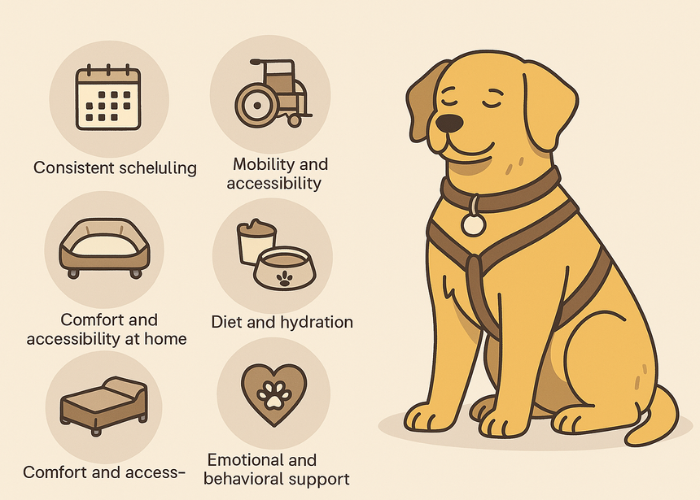Adopting a dog can be a life-changing experience for anyone, but seniors, in particular, can greatly benefit from this companionship. A four-legged friend offers not only company but also improves physical, mental, and emotional health. This article explores how having a dog can enhance the quality of life for seniors and provides tips for choosing and caring for the right pet.
1. Companionship and Reducing Loneliness
Loneliness is a common challenge among the elderly, especially those who live alone. A dog becomes a loyal friend, providing constant companionship and reducing feelings of isolation. Studies show that pet ownership can decrease symptoms of depression and boost overall well-being.
- Daily Interaction: Regular contact with a dog fosters a routine and creates moments of affection and engagement.
- Sense of Purpose: Caring for a dog gives seniors a reason to wake up every day and follow a structured routine.
Beyond offering emotional support, dogs can provide a sense of security, making seniors feel safer in their homes.
2. Physical Health Benefits
Caring for a dog involves various activities that encourage mobility and promote better physical health:
- Regular Walks: Walking a dog is an excellent form of exercise, improving cardiovascular health, strengthening muscles, and increasing energy levels.
- Improved Coordination: Activities such as feeding, brushing, and playing with a dog help enhance motor skills and coordination.
- Encouragement to Stay Active: Having a dog encourages seniors to move, even on days when motivation is low.
Additionally, studies have shown that dog owners often have lower blood pressure and cholesterol levels, reducing the risk of heart disease.
3. Positive Impact on Mental Health
The companionship of a dog is scientifically proven to benefit mental health. Dogs help reduce stress, anxiety, and even lower blood pressure.
- Hormones of Happiness: Interacting with a dog stimulates the production of serotonin and dopamine, neurotransmitters responsible for feelings of happiness and relaxation.
- Stress Reduction: A dog’s presence can lower cortisol levels, the stress hormone.
- Cognitive Stimulation: Training a dog or planning its routine stimulates the brain, helping maintain mental agility.
For seniors experiencing cognitive decline or early-stage dementia, interacting with a dog can provide comfort and a sense of familiarity.
4. Socialization and Building Connections
Walking a dog naturally leads to meeting new people. Parks, pet-friendly spaces, and dog-walking groups offer opportunities for seniors to connect with fellow dog lovers.
- Easier Conversations: Dogs are great conversation starters, helping seniors feel more confident when socializing.
- Community Engagement: Participating in pet-related events or joining groups fosters a sense of belonging.
A study found that seniors with pets have a higher likelihood of maintaining social connections, reducing feelings of isolation.
5. Choosing the Right Dog for Seniors
Not all dogs are suitable for elderly individuals. Selecting the right pet ensures a positive experience for both the owner and the animal.
- Size and Energy Level: Smaller breeds with moderate energy levels are easier to handle.
- Age of the Dog: Adult or senior dogs are often calmer and require less training.
- Temperament: Look for affectionate, well-behaved, and adaptable dogs.
Some of the best dog breeds for seniors include Shih Tzus, Pugs, Miniature Schnauzers, and Golden Retrievers.
6. Tips for Caring for a Dog in Later Years
For a harmonious relationship, seniors should adopt practices that simplify dog ownership:
- Establish a Stable Routine: Dogs thrive on consistency. Set fixed times for feeding, walking, and rest.
- Regular Veterinary Care: Ensure vaccinations and check-ups are up to date to maintain the pet’s health.
- Home Adaptations: Make sure the home is safe and comfortable for the dog, providing cozy resting areas.
If mobility is a concern, consider enlisting the help of family members or pet care services for assistance.
7. Addressing Potential Challenges
While owning a dog has numerous benefits, seniors should be prepared for potential challenges:
- Health Limitations: Seniors with physical limitations may need help with dog care, such as walking or grooming.
- Financial Considerations: Owning a dog comes with costs, including food, veterinary care, and grooming.
- Travel and Emergencies: Having a plan for pet care when traveling or in case of hospitalization is essential.
Pet-friendly housing options should also be considered before adopting a dog.
8. The Role of Therapy and Service Dogs
For seniors with specific health needs, therapy and service dogs provide additional benefits:
- Emotional Support Dogs: Help reduce anxiety and provide comfort.
- Service Dogs: Assist individuals with mobility issues by fetching objects, opening doors, or providing balance support.
- Dementia Assistance Dogs: Help seniors with cognitive impairments by offering structure and reminders.
Programs exist that match seniors with trained therapy or service dogs based on their needs.
9. How to Adopt a Dog as a Senior
For seniors considering adoption, several options are available:
- Animal Shelters and Rescues: Many shelters have adoption programs for seniors, offering reduced fees and matching the right dog to their lifestyle.
- Senior-to-Senior Programs: Some rescues specialize in pairing older adults with older dogs, which are often calmer and lower maintenance.
- Foster-to-Adopt: Trying temporary fostering before full adoption helps determine if the dog is a good fit.
Conclusion
Adopting a dog in later years is a decision that brings countless rewards. A pet not only reduces loneliness but also improves physical, mental, and emotional well-being. Daily walks, care routines, and companionship create moments of joy and connection, making a significant difference in a senior’s life.
If you or a loved one is considering adopting a dog, the aspects discussed here can help ensure a fulfilling experience. A dog is more than just a pet—they are loyal companions for life.
Frequently Asked Questions
What are the best dog breeds for seniors? Small, friendly breeds with moderate exercise needs, such as Shih Tzus, Pugs, Miniature Schnauzers, and Golden Retrievers, are great choices.
Is adopting an adult dog better for seniors? Yes, adult dogs are often calmer and already trained, making them a better match for elderly owners.
How often should a senior walk their dog? Two 20–30-minute walks per day are typically sufficient, but this depends on the dog’s energy level.
What if a senior has mobility issues? Opt for a smaller, less active breed, or arrange for assistance from family members, neighbors, or professional dog walkers.
Can dogs really improve seniors’ mental health? Yes, research confirms that pet ownership reduces stress, enhances mood, and combats loneliness, leading to overall better mental health.



